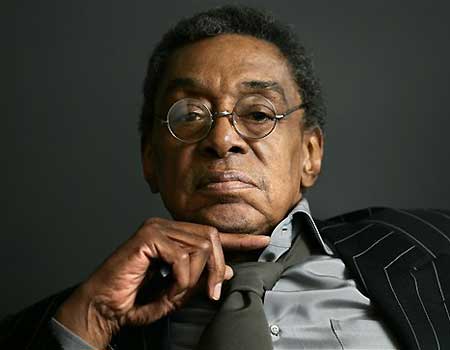
It always seemed more than a coincidence that the
name "Don Cornelius" rang with echoes of "Don Corleone." Sure, Corleone was a fictional
mob boss, while Cornelius was the real-life host of Soul Train. And, yes, Corleone
sat in a dim room dotted with cigar boxes and leather furniture, while
Cornelius had a neon soundstage filled with young people bouncing to the newest
dance music. But it was the similarities - the regal aura, the slow verbal
delivery, the seemingly unlimited power - that always brought the two together in
my mind.
Of course, Cornelius -- who died this morning
in Los Angeles from an apparent self-inflicted gunshot wound - was never dubbed "The Godfather."
That nickname already belonged to James Brown, one of the countless artists who
passed through his studio during the heyday of his show. And, in these hours
following the news of his death, the best possible tribute to the man is the
VH1 documentary, Soul Train: The Hippest Trip in America, which tells the
story of the journalist-turned-TV-host who ushered Aretha Franklin, Curtis
Mayfield, Isaac Hayes, Michael Jackson, B.B. King, Sly Stone, and Stevie Wonder
into our living rooms. If the programmers at VH1 have any good sense, they will
shelve the latest episode of Mob Wives, Baseball Wives, or Basketball
Wives and sub in the film that recounts not only the greatest grooves of all
time, but the hairstyles, the costumes, and the ubiquitous "Soul Train line "(two
groups facing each other while solo dancers prance and strut down the middle)
that came along with them.
In coming days plenty of people will make quips about the Soul Train line Cornelius will lead in Heaven. And
a few people, I'm sure, will suggest that the line will be in Hell. By 1986, when a sheepish Janet Jackson visited
the show, Cornelius was pretty far along in his transition from the classy MC
to the creepy uncle. And, like the great Marvin Gaye (who once played a game of one-on-one
with Cornelius, refereed by Smokey Robinson) the final years of Cornelius's life
were marred by rumors, violence, and of course, that fatal gunshot.
Whatever nuances and grim details await future biographers,
for now it is worthwhile to simply appreciate the scale of the Cornelius's
influence. Without Don C, we may not have heard the the Impressions or the
O'Jays; we may not have met the artists who sampled and rapped over these songs
decades later; and, for better or worse, we certainly wouldn't have the proliferation
of live-music shows like American Idol and The Voice that we see on
primetime television today.
If you don't have time to read the obituaries or
watch a full documentary, take a few minutes to watch the clip of Al Green's
visit to Soul Train to sing "Here I Am (Come and Take Me)" in 1974. It
begins as so many clips from the era do - with the dapper and deep-voiced
Cornelius saying, "Let's get it together, real good, one more time now, gang, for
the mighty Al Green!" What follows is perhaps the purest example of the Golden Age
of American soul music captured on film. On a stage decorated with cascading light bulbs,
a miniature funk orchestra honks and shakes and blasts with orgiastic intensity.
Al Green struts in front of them like a wild rooster, flapping his arms,
flinging roses into the crowd, and shrieking like a man possessed. Toward the
end of the performance, the singer raises his hand and commands the band to
bring down the music to light drum beat and a soft guitar.
"You may not know what I mean this evening," he
says, catching his breath and pacing the stage. "I wanna let you know that you
don't need no ticket." The music starts climbing to its earlier intensity, then
surpasses it, booming and shaking louder than ever.
"Everybody just get on board on the Soul Train,"
Green screams, as the music swells behind him. "Get on board! Everybody just
get on board!"



















